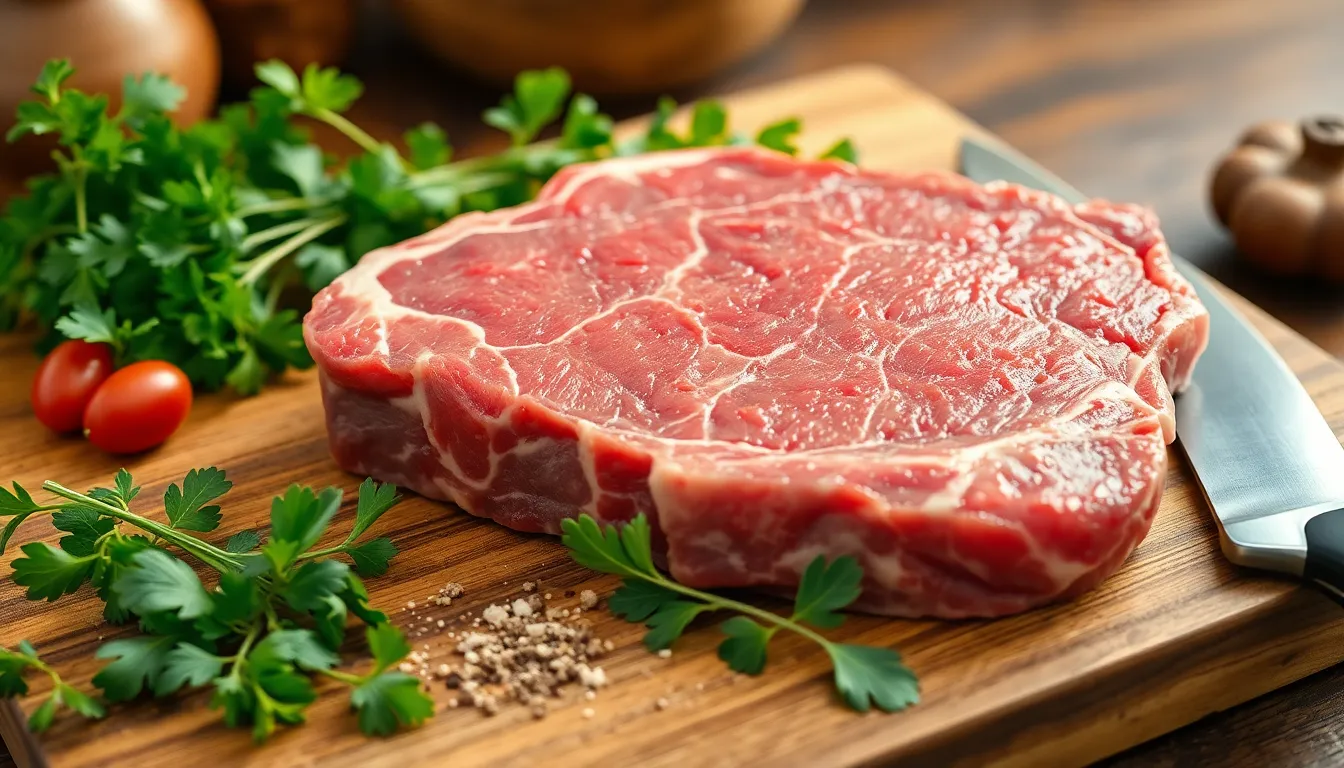Bison meat might just be the superhero of the protein world, swooping in to save dinner from the clutches of boring beef and chicken. Packed with flavor and nutrition, it’s like the cool cousin of red meat that everyone wants to hang out with. If you’re looking to spice up your meals while still keeping your health in check, bison is here to flex its muscles.
Bison Meat Nutrition
Bison meat stands out as a lean protein source, offering numerous nutritional benefits. It contains approximately 22 grams of protein per 3-ounce serving, making it comparable to beef but with less fat. The meat typically has around 2.4 grams of fat, which is significantly lower than many cuts of beef, contributing to its reputation as a healthier option.
Vitamins and minerals play a crucial role in bison’s nutritional profile. Bison meat is rich in vitamin B12, which supports nerve function and DNA synthesis. Furthermore, it provides high levels of iron, aiding in oxygen transport within the body. Each serving contains about 2.8 milligrams of iron, which meets a notable portion of the daily requirement for adults.
Omega-3 and omega-6 fatty acids contribute to overall health by promoting heart health and reducing inflammation. Bison meat has a more favorable fatty acid profile than beef, particularly when sourced from grass-fed bison. Sourcing practices directly influence bison meat’s omega-3 content, making it superior in terms of health benefits.
Saturated fat levels in bison meat remain lower, sitting around 0.9 grams per serving compared to beef’s significantly higher figures. This attribute further aligns bison meat with heart-healthy dietary goals.
Sustainability concerns also surround the production of bison meat. Bison farming generally utilizes less land and water than traditional cattle farming, making it an environmentally friendly choice for consumers. Choosing bison meat contributes to both personal health and sustainability efforts.
Bison meat not only offers an appealing taste but also provides vital nutrients, making it a valuable addition to a balanced diet.
Nutritional Profile of Bison Meat

Bison meat offers a robust nutritional profile that supports a healthy diet. It stands out not only for its rich flavor but also for its nutrient density.
Protein Content
Protein content in bison meat is impressive. A 3-ounce serving provides about 22 grams of protein, making it an excellent choice for muscle maintenance and growth. Leaner than many cuts of beef, bison meat typically contains around 2.4 grams of fat. This lower fat content contributes to a healthier protein source. Including bison meat in meals can enhance protein intake without excessive calories or unhealthy fats. Its amino acid profile supports overall health, making bison an attractive option for active individuals.
Vitamins and Minerals
Bison meat is high in essential vitamins and minerals. It contains significant amounts of vitamin B12, which aids in nerve function and energy production. Iron content reaches approximately 2.7 milligrams per 3-ounce serving, bolstering oxygen transport in the body. Additionally, bison is a good source of zinc, vital for immune system function. The combination of these nutrients helps promote overall well-being. Grass-fed bison meat tends to offer higher levels of beneficial nutrients compared to grain-fed counterparts, making it an even better health choice.
Health Benefits of Bison Meat
Bison meat offers numerous health benefits that make it an excellent choice for those looking to enhance their diets. With a low-fat content, it stands out in the realm of protein sources.
Low in Fat
Bison meat contains approximately 2.4 grams of fat per 3-ounce serving. This amount significantly undercuts many traditional red meats. Leaner cuts of bison can contain even less fat, promoting heart health. Such low fat levels make it ideal for individuals focused on weight management. Nutrient-rich yet light, bison supports various dietary needs, including low-carb and paleo diets. Substituting bison for higher-fat meats can help reduce overall calorie intake. Health-conscious consumers benefit from its combination of flavor and leanness.
Rich in Omega-3 Fatty Acids
Bison sourced from grass-fed farms boasts higher levels of omega-3 fatty acids. These beneficial fats contribute to reduced inflammation and improved cardiovascular health. Approximately 0.3 grams of omega-3s can be found in a 3-ounce serving of grass-fed bison. This level surpasses that of conventional beef, making bison a more heart-healthy option. Omega-3s are essential for brain function and may aid in mood regulation. Including omega-3-rich bison in one’s diet supports overall wellness and helps meet nutritional needs. With these advantages, bison stands out as an optimal meat choice for health-focused individuals.
Comparison with Other Meats
Bison meat offers a compelling alternative when compared with other meats, notably beef and chicken. It provides approximately 22 grams of protein per 3-ounce serving, which is comparable to lean cuts of beef. In terms of fat content, bison usually has around 2.4 grams, significantly lower than many beef options, making it a favorable choice for those monitoring their fat intake.
Vitamin and mineral content sets bison apart as well. A serving of bison meat is rich in vitamin B12, iron, and zinc, all essential for various bodily functions. By comparison, beef also contains these nutrients; however, bison tends to provide them in healthier proportions. Additionally, grass-fed bison is particularly noted for its higher omega-3 fatty acid content, which supports heart health.
When evaluating environmental impacts, bison farming offers advantages over traditional cattle farming practices. Bison require less land and water, making them a more sustainable protein source. This benefits both health-conscious consumers and those aiming to support eco-friendly agricultural practices.
Compared with chicken, bison has a higher protein density and nutrient richness, which appeals to fitness enthusiasts and health-minded individuals. Chicken offers versatility, but it doesn’t match the robust flavor and nutrient profile that bison provides.
Shopping for meats can feel overwhelming, yet understanding the nutritional differences helps make informed choices. Bison stands out as a nutrient-dense option for consumers seeking exceptional flavor and health benefits. Each variety has its place in a balanced diet, but bison meat provides unique attributes that enhance nutritional value.
Culinary Uses of Bison Meat
Bison meat’s rich flavor makes it a versatile ingredient in various culinary applications. Chefs frequently use ground bison in dishes like burgers, meatloaf, and tacos due to its lean quality and robust taste. Steaks from bison can be grilled or pan-seared, offering a delightful alternative to traditional beef steak.
Bison roasts provide a flavorful centerpiece for family dinners or special occasions. Preparing bison in a crockpot creates tender shredded meat perfect for hearty stews or sandwiches. Utilizing bison in chili adds depth and a punch of protein, making it an excellent choice for comfort food lovers.
Bison sausages serve as a tasty option for grilling at cookouts. Many enjoy using bison in stir-fries, where its unique flavor complements a variety of vegetables and sauces. Additionally, meatballs crafted from bison are both nutritious and flavorful, suitable for pasta dishes or served as appetizers.
Cooking techniques can vary based on the cut of bison meat. Slow cooking works well for tougher cuts, allowing flavors to meld and creating a tender outcome. Seasoning bison with herbs and spices enhances its natural taste; rosemary, thyme, and garlic can elevate the meat’s profile across various recipes.
Inclusion of bison meat in diverse recipes broadens meal options for health-conscious consumers. Experimentation with bison meat invites creativity in the kitchen while still aligning with nutritional goals. Ultimately, bison meat’s culinary flexibility serves not only to improve flavor but also to support a healthier lifestyle.
Conclusion
Bison meat serves as a nutritious and delicious alternative to traditional red meats. Its impressive protein content and low-fat profile make it an excellent choice for those focused on health and wellness. With a rich array of essential vitamins and minerals bison meat supports overall well-being while promoting heart health through its favorable fatty acid composition.
Additionally bison’s environmental benefits highlight its role in sustainable farming practices. By incorporating bison into a diet individuals can enjoy flavorful meals that align with both health goals and eco-conscious choices. This versatile meat not only enhances culinary experiences but also contributes significantly to a balanced diet.

